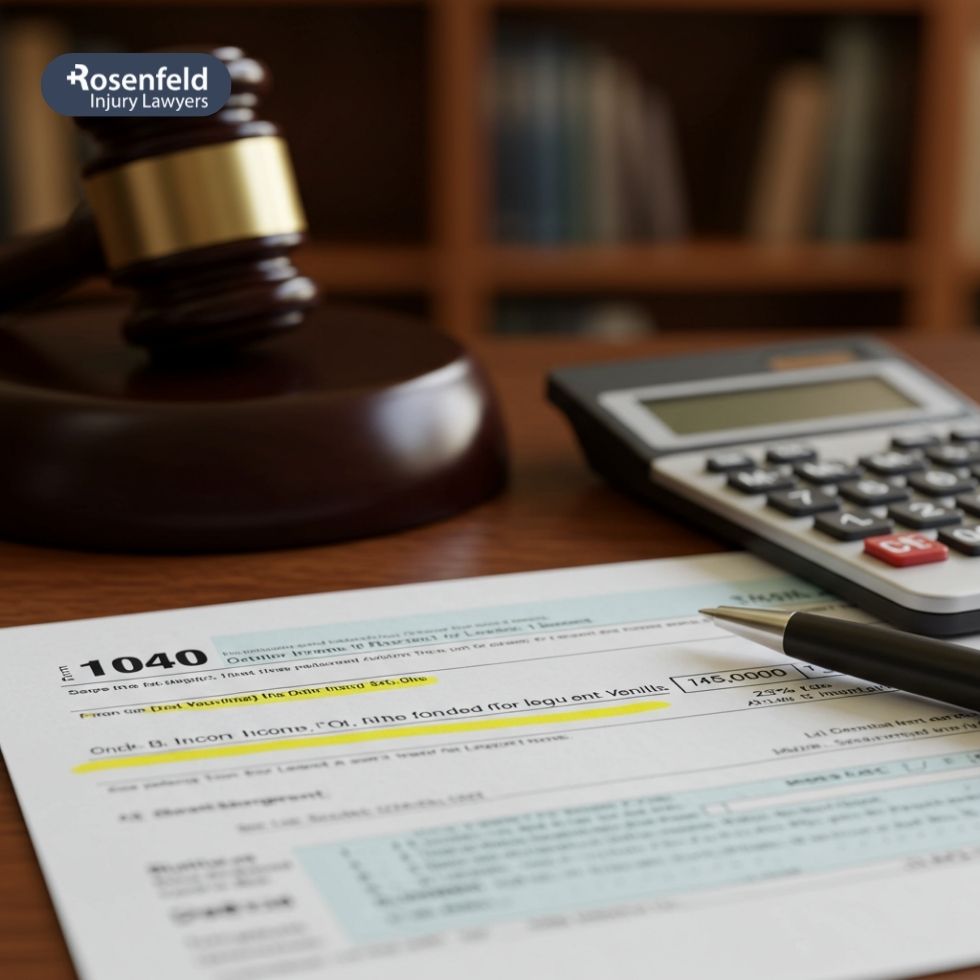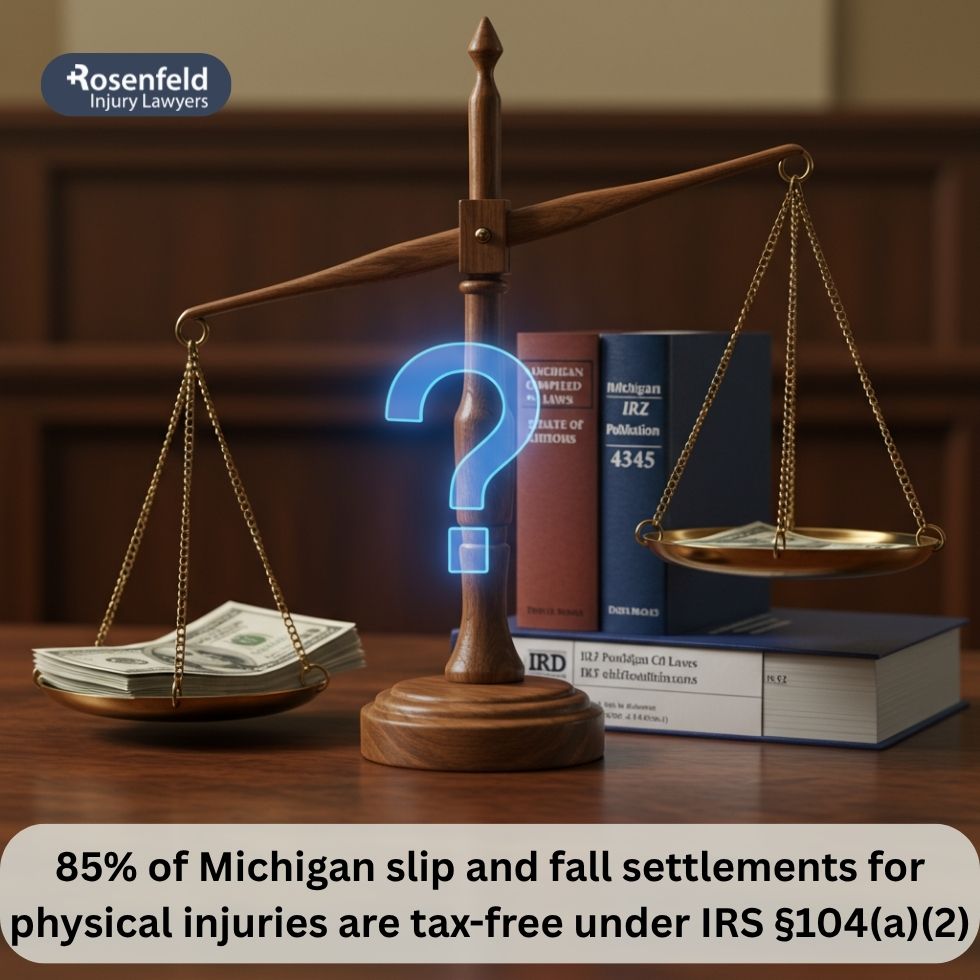Are Slip and Fall Settlements Taxable?
Upon getting a settlement, clients often wonder, “Are slip and fall settlements taxable?” The answer depends on the type of damages you receive. It’s crucial to speak to a financial professional about the tax implications of your settlement so that you’re not surprised by your tax return. Contact our personal injury attorneys today for a free consultation about your options.
Understanding Personal Injury Settlements for Slip and Fall Cases
A personal injury settlement provides compensation for emotional and physical injuries after an accident. Most personal injury settlements are determined out of court through negotiations with the liable party. These payments are typically categorized into economic and non-economic damages, which may be treated differently by the IRS.

Are Slip and Fall Personal Injury Settlements Taxable?
According to the Internal Revenue Service, damages for physical injuries are not considered taxable income as long as they do not include previously deducted medical expenses (26 U.S. Code § 104).
When Do You Have to Pay Taxes on a Slip and Fall Settlement?
You may have to pay IRS taxes on certain portions of your settlement, so it’s crucial to speak to an accountant about your tax benefits and ensure proper reporting of any expenses.
Tax Treatment of Medical Expenses in a Settlement
Payments for medical expenses are not taxable income as long as they were not previously deducted in another year’s tax return. For example, if you were in a slip and fall accident two years ago and have deducted your medical bills on your tax documents for both those years, you may have to pay taxes on this portion of your settlement.
Compensation for Lost Wages
Lost wages in personal injury cases are considered taxable because they replace your taxable income.
Taxes on Emotional Distress and Mental Anguish in Slip and Fall Cases
The tax status of emotional distress depends on whether it is directly tied to physical injuries. If you receive pain and suffering damages that are directly tied to an injury, then they are not taxable. However, if you incur damages that aren’t related to your injury, such as inconvenience or loss of reputation, you may be liable for tax on them.
Property Damage and Replacement Costs
Compensatory damages for property damage, such as broken phones or damaged clothing, are not considered taxable as long as they do not exceed the property’s real value.
Are Punitive Damages Taxable in Illinois?
If your settlement includes punitive damages, you will have to pay some income tax. Illinois treats punitive damages as separate from compensatory damages in accordance with federal income tax law (735 ILCS 5/2-1115.05). Unlike compensatory damages, these damages are considered taxable income under federal law (26 U.S. Code § 104), including for a personal injury settlement.
Are Attorney Fees Deductible or Taxable?
If you receive purely economic compensation, such as for physical injuries and property damage, then your attorney fees are deductible. However, if you received non-economic damages, such as pain and suffering, or punitive damages, then a portion of your costs is taxable.
How Much Is the Slip and Fall Settlement Tax?
Your settlement tax depends on the amount of your compensation and the type of payments you have received. Any compensation for physical harm is not taxable, while compensation for purely emotional distress or punitive damages is taxable.
Are There Any State Taxes on Personal Injury Lawsuits in Illinois?
The Illinois Department of Revenue notes that it follows federal guidelines on settlement taxes. As such, if federal law denotes the personal injury lawsuit settlement amount as taxable, then it will also be subject to state tax. Damages for physical harm, like medical expenses, are usually not taxable, but punitive or non-economic damages may be considered income.

Tips for Protecting Your Slip and Fall Settlement from Tax Liability
Our attorneys work closely with clients in personal injury cases to ensure that they are aware of their tax liabilities. However, you should consult with a tax professional before signing any settlement agreement. A tax advisor can review the potential tax benefits of your settlement, including how much you may owe and how to shield your compensation from possible repercussions.
When you receive a settlement agreement, ask to have it broken down by damage type so that you can calculate your potential taxes. You can also request a tax allocation letter that will state your responsibilities. The Illinois Department of Revenue or the Internal Revenue Service may send you a letter requesting additional information about your settlement.
Get Help from a Slip and Fall Lawyer in Illinois
Experienced legal representation can help ensure a successful premises liability claim while also minimizing your tax exposure. We work on a contingency fee basis, meaning that you owe us nothing unless we secure compensation for you. If you’ve had a slip and fall accident on a negligent property owner’s premises, contact us for a free, no-obligation legal consultation about your rights.
Content reviewed by Chicago slip and fall accident lawyer Jonathan Rosenfeld of Rosenfeld Injury Lawyers LLC, who holds property owners and management companies accountable to obtain justice for injured visitors and tenants, and is a trial lawyer recognized by Super Lawyers, Lawyer Legion, and Distinguished Justice Advocates for premises liability litigation.







